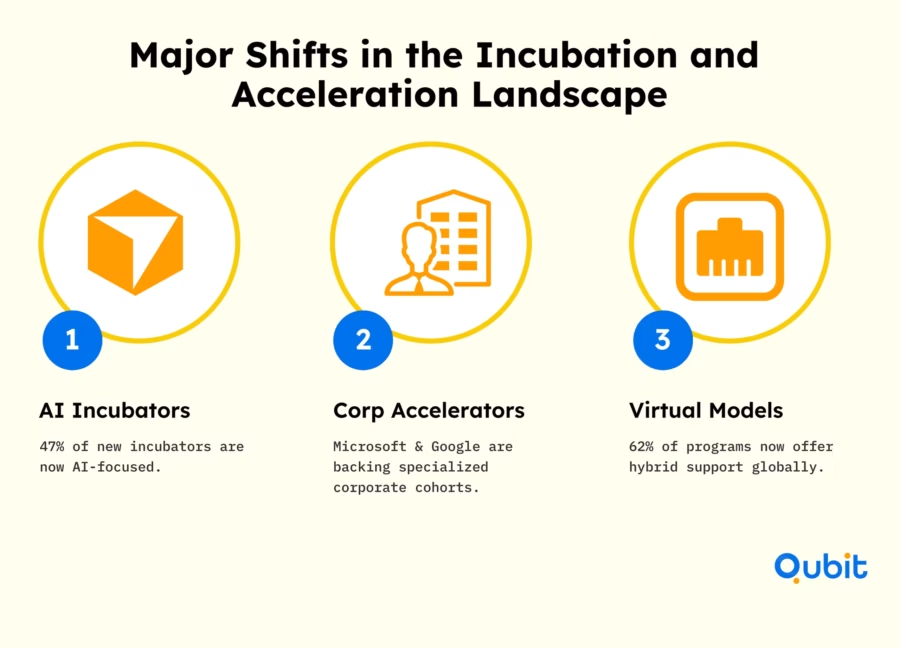Over 70% of startups that graduate from startup incubators or accelerators go on to raise follow-on funding. But are these programs right for every founder?
This blog breaks down the differences between incubators and accelerators—what they offer, how they operate, and which funding opportunities and growth strategies come with each. Whether you're launching from scratch or scaling up, understanding the right kind of support can make or break your next milestone.
For founders considering full independence instead, bootstrapping strategies for startups show what it looks like to grow without structured programs or outside capital.
We’ll compare timelines, equity terms, application tips, and long-term outcomes. Let’s jump right in.
How Startup Incubators and Accelerators Stack Up
Startup incubators and accelerators play pivotal roles in fostering entrepreneurial success, yet their approaches differ significantly. Incubators focus on nurturing early-stage ideas through long-term support, while accelerators emphasize rapid scaling and market readiness. Understanding these distinctions can help founders choose the right path for their venture.
Incubators: Long-Term Growth and Support
Incubators are designed to provide startups with extended resources and mentorship over months or even years. These programs often include access to office space, legal assistance, and industry-specific guidance. For example, TechNexus connects entrepreneurs with mature corporations, offering specialized support and strategic partnerships. Similarly, Capital Factory provides startups with mentorship and investor networks, ensuring they have the tools to refine their business models.
Academic incubators also play a unique role in bridging research and industry. A case study on Academic Incubator Network Expansion highlights how physical incubators equipped with maker spaces and corporate partnerships led to a 40% increase in student-led patent filings. Programs like Harvard Labs help academic entrepreneurs transition their ideas into market-ready solutions.
Accelerators: Fast-Track to Market
Accelerators, on the other hand, focus on short-term, intensive programs that prepare startups for rapid scaling. These programs typically last a few months and include structured mentorship, workshops, and direct access to investors. For instance, Seedcamp in Europe provides early-stage funding and resources to help startups refine their business models and achieve market readiness.
Accelerators are ideal for startups that already have a viable product and need to scale quickly. They emphasize speed and efficiency, ensuring founders can pitch their ideas to investors and enter the market within a compressed timeframe.
Hybrid Models: Combining the Best of Both Worlds
Hybrid programs aim to blend the nurturing benefits of incubators with the growth acceleration of accelerators. These models provide startups with extended mentorship while also offering structured pathways to scale. Programs like Wayra connect tech-focused founders with investment opportunities and networking avenues, bridging the gap between incubation and acceleration.
By combining elements of both incubators and accelerators, hybrid models cater to startups at various stages of development, ensuring they receive tailored support to meet their specific needs.
Choosing between incubators, accelerators, or hybrid models depends on the stage of your startup and your growth objectives. Each offers unique advantages, making it essential to align your choice with your business goals.
Weighing the Pros and Cons of Startup Incubators
Joining a startup incubator can be a transformative experience, but it’s essential to weigh the benefits against the challenges. These programs are designed to nurture early-stage companies, offering resources and guidance that can accelerate growth.
Advantages of Startup Incubators
Startup incubators provide access to a robust network of professionals and peers. This community fosters collaboration and opens doors to partnerships that might otherwise be difficult to establish. Additionally, incubators often offer experienced mentors who guide founders through critical decisions, helping them avoid common pitfalls.
Another significant advantage is the reduction in overhead costs. Many incubators provide shared office spaces, equipment, and administrative support, allowing startups to focus their budgets on innovation and scaling. This shared-resource model can be particularly beneficial for companies operating on tight financial margins.
Challenges of Startup Incubators
Despite their benefits, incubators come with their own set of challenges. The application process is highly competitive, requiring startups to demonstrate their potential for success. Even after acceptance, participants must commit to structured training programs that may demand significant time and energy.
Creative flexibility can also be limited. Incubators often have predefined frameworks and expectations, which may not align with every founder’s vision. Balancing these requirements with the need to innovate can be a delicate task.
Startup incubators offer a mix of opportunities and obstacles, making it crucial for founders to assess whether the program aligns with their goals. For those ready to embrace the structure and support, incubators can be a powerful catalyst for growth.
The Upsides and Downsides of Startup Accelerators
Startup accelerators have become a cornerstone for early-stage ventures aiming to achieve rapid growth. These programs, such as Techstars, provide startups with intensive mentorship, funding, and access to a network of investors, often in exchange for equity. While the benefits are significant, there are also challenges that founders must weigh carefully.
Advantages of Startup Accelerators
One of the most compelling benefits of accelerators is their ability to connect startups directly with investors. Programs like Y Combinator offer seed funding—up to $500,000 in some cases—allowing founders to focus on product development rather than immediate fundraising. Additionally, accelerators provide specialized mentorship tailored to the unique needs of each startup. For example, Founder Institute supports early-stage founders in refining their MVPs, while Startupbootcamp focuses on industry-specific solutions through its specialized cohorts.
The competitive environment within accelerators also fosters accelerated growth. Startups are pushed to achieve milestones quickly, often leading to significant traction. A case in point is Xendit, which participated in a three-month Y Combinator program and achieved 25% monthly growth, raising $18.3M in funding.
Challenges to Consider
Despite their advantages, accelerators come with notable challenges. Acceptance rates are notoriously low, making it difficult for many startups to secure a spot. Additionally, the equity exchange—typically ranging from 5% to 10%—can be a tough decision for founders. Programs like Techstars, for instance, require 6% equity in exchange for $120,000 in funding.
The demanding schedules of accelerators can also be overwhelming. Founders must balance program requirements with the day-to-day operations of their startups, which can lead to burnout if not managed carefully.
Startup accelerators can be transformative, but they are not a one-size-fits-all solution. Founders should evaluate the trade-offs to determine if these programs align with their long-term goals.
How to Choose Between an Incubator and an Accelerator
Each option offers different support structures, timelines, and outcomes—so your decision should match your current stage and goals.
- Incubators suit early-stage startups still shaping their idea or business model. They offer mentorship, resources, and time to build foundational strength.
- Ideal if you’re pre-MVP, still forming your team, or exploring product-market fit.
- Accelerators are built for startups ready to grow. They help scale operations, secure funding, and expand fast—usually in a structured, time-limited program.
- Best fit if you already have traction, a working MVP, or early customers and want to raise capital or enter new markets.
- Assess your startup’s stage, funding needs, and team readiness to choose wisely.
- Align the program with your vision for growth—whether you're building the foundation or pushing for scale.
How Support Programs Strengthen the Startup Ecosystem
Incubators and accelerators play a pivotal role in fostering a thriving startup ecosystem. These programs serve as innovation hubs, connecting entrepreneurs with mentors, investors, and peers to share resources and ideas. By creating a collaborative environment, they spark creativity and fuel innovation, enabling startups to tackle challenges with fresh perspectives.
Participation in these programs significantly boosts startup survival rates. Early-stage businesses gain access to critical tools, guidance, and funding, which reduces the risk of failure and enhances their ability to scale. Moreover, the ripple effect of these programs extends beyond individual startups, generating employment opportunities and contributing to broader economic growth.
The cumulative impact of incubators and accelerators is undeniable. By nurturing entrepreneurial talent and fostering community networking, they strengthen the foundation of the startup ecosystem, ensuring its sustainability and long-term success.
Your Guide to Funding and Growth Beyond Incubators and Accelerators
Exploring funding options outside traditional incubators and accelerators can open new doors for startups seeking growth. Alternatives such as crowdfunding, angel investing, and bootstrapping provide distinct advantages, allowing founders to retain greater control over equity while tailoring their strategies to unique business needs.
https://qubit.capital/blog/blog-top-crowdfunding-platforms-startups, for instance, enable startups to raise capital directly from their target audience, fostering early customer engagement and validation. Angel investors, on the other hand, bring not only funding but also industry expertise and mentorship, which can be invaluable during critical growth phases. Bootstrapping, though challenging, empowers entrepreneurs to build their businesses without external interference, ensuring complete ownership of their vision.
Major Shifts in Incubator and Accelerator Landscape

The startup ecosystem continues to evolve, with emerging trends reshaping how businesses grow and innovate. One notable shift is the rise of AI-focused incubators, which now account for 47% of new incubators. These programs provide specialized infrastructure tailored to founders exploring deep tech solutions, fostering innovation in artificial intelligence.
Another significant development is the expansion of corporate accelerators, as major firms like Microsoft and Google increasingly invest in specialized cohorts. These accelerators offer startups access to enterprise-level distribution channels, creating opportunities for scalable growth.
Meanwhile, virtual incubation models are gaining traction, with 62% of programs adopting hybrid approaches that incorporate digital platforms. This shift enables cross-border mentorship and broader participation, breaking geographical barriers for startup founders.
Microloans for startups play a pivotal role in helping founders pursue leaner growth strategies, often introduced through incubators that connect entrepreneurs with flexible early-stage funding options.
Conclusion
Choosing the right program can significantly impact a startup's trajectory. This article explored the key strategies behind incubators and accelerators, highlighting their comparative benefits. While incubators provide a nurturing environment for early-stage startups, accelerators focus on rapid growth and scaling. Both options offer unique advantages, but the decision ultimately depends on aligning the program with your startup's specific needs and goals.
Taking the next step is crucial for turning ideas into impactful ventures. If you're ready to secure funding and support tailored to your growth, our Fundraising Assistance service is designed to help startups accelerate their journey. Contact us today to explore how we can support your vision.
Key Takeaways
- Incubators nurture startups with long-term mentorship and resource-rich environments.
- Accelerators drive rapid growth through intensive, short-term programs with investor access.
- Choosing between the two depends on a startup’s stage, funding needs, and growth strategy.
- Alternative funding models can complement traditional programs effectively.
- Real-world case studies and trends offer actionable insights for founders.
Frequently asked Questions
What are the benefits of incubators?
Incubators provide long-term mentoring, office support, and a nurturing ecosystem that encourages sustainable growth and innovation.


 Back
Back



